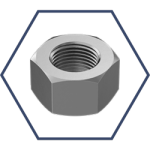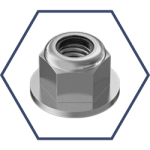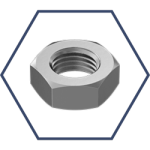Welcome to PT. Sinergi Industri Prima (SIP), the ultimate destination for specialty nuts designed to meet the demands of the energy industry.
Our precision-crafted, high-quality hardware nuts ensure strength and reliability in various applications. With an extensive range of types, sizes, and materials available, our ISO 9001:2015 certified products make it easy for oil and gas plant engineers and purchasing managers to find the right solution for their needs.









What Are Specialty Nuts
Hardware nuts are essential fastening components in the energy industry, designed to secure objects together. These compact metal fasteners feature a threaded hole that pairs with bolts or screws, ensuring stability and preventing loosening. Specialty nuts cater to the energy sector’s unique demands and are available in various sizes, materials, and types – such as hexagonal, heavy hex, and flange nuts. A proper understanding of these nuts is vital for appropriate selection and use.
Types of Specialty Nuts
In the energy industry, specialty nuts play a vital role in securing components and ensuring the safe operation of equipment. With a variety of unique designs, different fasteners cater to specific demands. Understanding the nuances of these specialty nuts enables professionals to select the most suitable fastening solutions, contributing to improved performance and reliability in energy-related applications.
Hex Nuts
Hex nuts are a fastener used in the energy industry to secure and hold components such as pipes, valves, and flanges together. They are called hex nuts because of their six-sided shape and are typically made of durable materials such as steel or stainless steel to withstand the harsh environments of the energy industry. Hex nuts are essential in ensuring the safe and efficient operation of energy systems.
Lock Nuts
Lock nuts are a fastener used in the energy industry to secure bolts and prevent them from coming loose due to vibrations or other external forces. These nuts are designed with a locking mechanism that provides a more secure and reliable connection, which is critical in applications where safety and reliability are paramount. Lock nuts are commonly used in energy-related equipment such as turbines, generators, pumps, and compressors.
Heavy Hex Nuts
Heavy hex nuts are commonly used in the oil and gas industry for their ability to withstand high pressure and temperature. They have a larger size and thicker walls than standard hex nuts, making them more durable and corrosion-resistant. Heavy hex nuts are typically used in critical applications such as pipeline construction, drilling rigs, and offshore platforms where reliability and safety are paramount.
Finished Hex Nuts
Finished hex nuts are a fastener used in the oil and gas industry to secure pipes, valves, and other equipment. These nuts have six sides and are typically made of high-strength materials such as stainless steel or titanium to withstand the harsh environments and pressures of oil and gas operations. They are essential in ensuring the safety and reliability of the equipment and infrastructure in the industry.
Hex Flange Nuts
Hex flange nuts are a type of fastener that combines the features of a hex nut and a flange. They have six sides like a hex nut and a broad, circular base with a serrated edge that provides a larger surface area to distribute pressure and prevent loosening. They are commonly used in automotive, aerospace, construction, and industrial applications where vibration and movement are a concern.
Coupling Nuts
Coupling nuts are threaded fasteners that are used to connect two threaded rods or bolts. They have a cylindrical shape with internal threads on both ends, allowing them to be screwed onto the threaded ends of two separate rods or bolts to join them effectively. Coupling nuts are commonly used in construction, machinery, and automotive applications and are available in various sizes and materials to suit different needs.
Jam Nuts
In the energy industry, jam nuts are a fastener used to secure two threaded objects, such as pipes or valves. They are typically used with another nut to prevent loosening due to vibration or other external forces. Jam nuts are essential in ensuring energy infrastructure’s safe and reliable operations.
Hex Cap Nuts
Hex cap nuts are a fastener commonly used in the oil and gas industry to secure equipment and components in place. They are designed with a hexagonal shape and a threaded hole in the center, allowing them to be easily tightened and loosened with a wrench or other tool. Hex cap nuts are typically made from high-strength materials like steel or titanium to withstand the harsh and demanding conditions of the oil and gas industry.
Square Nuts
Square nuts are a fastener commonly used in the energy industry to secure and connect components such as pipes, valves, and flanges.
They have a square shape and are typically made of durable materials like stainless steel or carbon steel to withstand the harsh conditions of the industry. Square nuts are essential in ensuring that energy systems operate safely and efficiently.
Imperial Nuts Vs. Standard Nuts
Metric nuts are typically characterized by their thread pitch and the distance between threads and are measured in millimeters.
On the other hand, Imperial nuts are typically characterized by their thread count, thread pitch, and the diameter of the nut and are measured in inches.
Metric Nuts
Imagine a world of precision, where every component fits seamlessly and effortlessly into place; this is the realm of metric nuts.
As a crucial element in hardware nuts, metric nuts are specifically designed to adhere to international standards, ensuring compatibility with an extensive range of bolts and fasteners.
Expertly crafted using high-quality materials such as stainless steel, brass, or nylon, these versatile components boast superior strength and durability.
Metric nuts are available in various shapes and sizes – from the classic hexagon to more specialized types like flange, lock, or wingnuts – catering to diverse industrial applications.
No matter the project, incorporating metric nuts guarantees a secure and reliable connection for years.
Imperial Nuts
While metric nuts cater to international standards, it is essential to pay attention to the importance of their counterpart: imperial nuts.
As hardware nuts designed following the Imperial measurement system, these components exhibit exceptional strength and durability, making them indispensable in various industries.
Imperial nuts come in various shapes and sizes, similar to their metric counterparts. They use inches as their unit of measurement. These include hexagonal, flange, lock, and wingnuts – ensuring compatibility with a wide range of bolts and fasteners.
Consequently, metric and imperial nuts are vital in achieving secure connections across diverse projects and applications worldwide.
Industry Standards And Specifications
Having delved into the diverse types of nuts, it becomes crucial to explore the industry standards and specifications governing these hardware components’ production and usage. Adherence to established guidelines ensures uniformity, quality, and reliability in fasteners such as Hillman hex nuts or others.
These standards are formulated by various organizations, including the American Society for Testing and Materials (ASTM), International Organization for Standardization (ISO), and British Standards Institution (BSI). Such specifications encompass dimensions, material composition, mechanical properties, and application performance requirements.
By following these industry benchmarks, manufacturers can guarantee that their products meet the necessary criteria for safe and efficient use in various projects. Thus, knowledge of these standards elevates one’s comprehension of hardware nuts and fosters an appreciation for the rigorous processes involved in producing dependable fastening solutions.
Nut Size and Design
The appropriate nut size and design are crucial for maintaining stability and durability in energy industry applications.
Nut Size
Choosing the right nut size ensures secure connections in various energy-related projects. Understanding the relationship between screw threads and nut dimensions allows for precise adjustments and optimized performance in tasks ranging from routine maintenance to large-scale installations. Mastery of nut size selection significantly enhances the effectiveness and efficiency of energy industry endeavors.
Nut Design
Nut design is equally vital in the energy industry, as it impacts the performance and longevity of mechanical connections. Understanding different nut designs, including their advantages and limitations, is essential for achieving optimal results. Material compatibility, load distribution capabilities, and resistance to harsh environments should be considered when selecting the most suitable design for specific energy industry applications. Knowledge of nut design contributes to improved proficiency in hardware-related tasks within the energy sector.
Commonly Used Thread Types In The Oil And Gas Industry
API thread types are standard for most connections in the oil and gas industry.
NPT threads are used for connecting and sealing pipes and are defined by the American National Standard Pipe Thread standards.
UN threads, also known as Unified National Coarse (UNC) and Unified National Fine (UNF) are used mainly for fastening applications.
API Thread Types
API thread types, established by the American Petroleum Institute, are essential for the safe and efficient operation of drilling and production equipment in the oil and gas industry. These threads are designed to withstand extreme conditions and provide reliable sealing and wear resistance.
NPT Threads
National Pipe Taper (NPT) threads are commonly used for pressure-tight connections in the energy industry. These tapered threads self-seal as they are tightened, ensuring secure and leak-free connections without requiring additional sealing materials.
UN Threads
The oil and gas sector also uses UN (Unified National) threads, including UNC, UNF, and UNEF series, for securing connections. These parallel threads facilitate easy assembly and disassembly while complying with international standards. However, supplementary sealing methods may be needed due to their non-tapered design.
Understanding API, NPT, and UN threads is vital for energy industry professionals to optimize equipment performance and maintain operational safety in various projects.
Nut Selection Criteria
Choosing the correct hardware nuts for oil and gas or energy industry applications requires careful consideration of thread size, material, and finish.
Thread Size
Thread size ensures compatibility between nuts and bolts in the energy sector. Understanding various thread sizes, including metric and imperial measurements, is essential for informed decision-making in selecting suitable hardware nuts for diverse applications.
Material
Material selection is critical in determining the performance and durability of nuts in oil and gas or energy industry projects. Different materials like stainless steel, alloy, and superalloys offer unique properties like corrosion resistance and tensile strength. Evaluating project requirements and selecting the appropriate material is vital for ensuring the functionality and longevity of assembled systems.
Finish
The finish applied to hardware nuts affects corrosion resistance, wear resistance, and aesthetics. Various finishes like zinc plating, hot-dip galvanizing, or electroless nickel plating cater to different application requirements and environmental conditions. Considering these factors when selecting a suitable finish optimizes nut performance and protects against corrosion or wear.
In conclusion, evaluating thread size, material properties, and surface finish is essential for making informed decisions when choosing hardware nuts for oil and gas or energy industry applications.
Benefits of Using Hardware Nuts
Using nuts in the energy industry offers several key benefits, ranging from versatility to durability.
Nuts provide secure connections, especially when paired with coarse threads, increasing resistance against loosening due to vibrations or external forces. Materials like zinc-plated steel offer corrosion resistance, extending the lifespan of both the nuts and the structures they support.
This durability is crucial in the energy sector, where equipment and infrastructure often face harsh conditions. With a wide range of nut varieties available for different applications and requirements, these fasteners play an essential role in keeping the energy industry’s projects securely anchored.
Request a Quote
Hardware nuts play a vital role in the assembly and fastening of components across the energy and oil and gas industries. At PT. Sinergi Industri Prima (SIP), we provide top-quality, ISO 9001:2015 accredited nuts that adhere to strict industry standards, ensuring longevity and reliability for your projects.
Contact our team of experts today to explore our extensive range of specialty nuts tailored for the energy and oil and gas sectors. Let us help you find the perfect solution for your application. Request a quote now and secure the success of your project.
